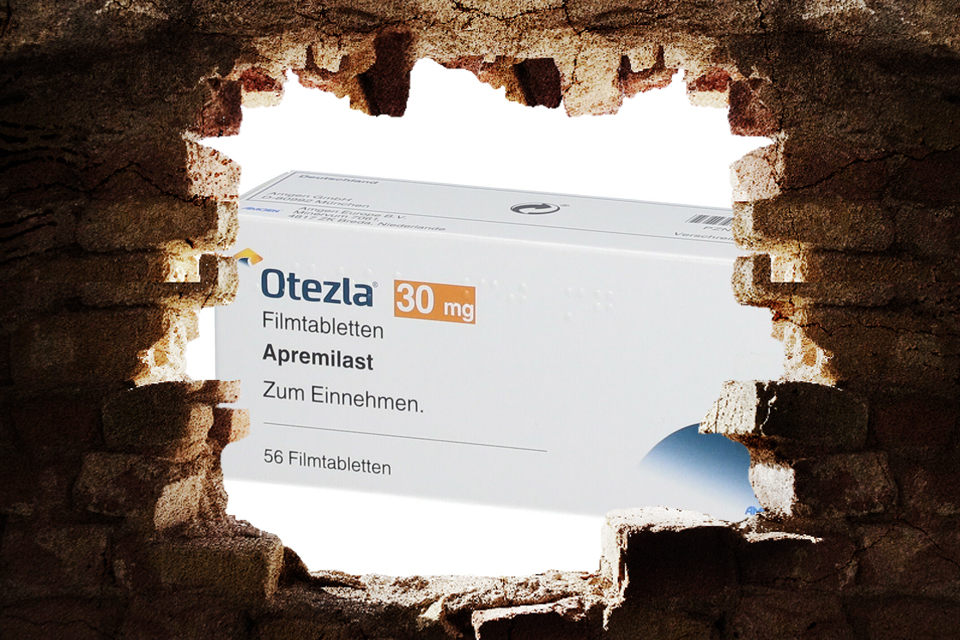IPTAB issues partial rejections in Otezla use patent trial

In a recent development concerning Amgen's psoriasis treatment patents, the sole remaining use patent has encountered a setback from South Korean pharmaceutical firms. Despite a waiting period of approximately three y`1ears, the patent's expiration date is slated for 2028, leaving room for a potential appeal.
On August 25th, industry sources reported that the Korean Intellectual Property Trial and Appeal Board (IPTAB) issued partial rejections and dismissals in the patent invalidation trial for the patent titled '(+)-2-[1-(3-ethoxy-4-methoxyphenyl)-2-methylsulfonylethyl]-4-acetylaminoisoindoline-1,3-dione: its composition and usage method.' This patent had been challenged by several companies, including Daewoong Pharma, Dong-A ST, ChongKunDang, DongKoo Biopharma, Mother's Pharma, Yuyu Pharma, Huons, and Cosmax Pharma on August 24th.
The patent in question pertains to the use of Amgen's psoriasis treatment, Otezla (active ingredient: Apremilast), which is not presently available in the South Korean market and is scheduled to expire in March 2028. This patent signifies the specific application of a non-existent drug. In this context, the Korean pharmaceutical companies have encountered difficulty in bypassing the patent for the utilization of a drug that is no longer accessible.
The outcome of this trial is expected to bring frustration to the South Korean pharmaceutical companies. The circumstances surrounding Otezla's absence from the market prompted the pharmaceutical industry to step in, seeking an opportunity. However, the primary obstacle to product release originated from the defense of the original company's patent.
Celgene was the initial entity to introduce Otezla to the South Korean market. Following its approval in 2017, speculation arose about Bristol Myers Squibb (BMS), which acquired Celgene, taking steps towards reimbursement. However, a twist occurred when BMS sold the product to Amgen. Subsequently, two rounds of price negotiations faltered, leading to the product's withdrawal from the domestic market.
South Korean companies were enticed by the prospect of offering the first orally administered PDF-4 inhibitor for the treatment of psoriasis and psoriatic arthritis, a category that gained global recognition. Additionally, due to high expectations in clinical settings, they engaged in patent disputes to facilitate the production of generics. Among these companies, Yuyu Pharma took the initiative to file a lawsuit, while others continued their competitive endeavors.
Initially, Daewoong Pharmaceuticals and Dong-A ST initiated a scope confirmation trial for the Evergreening formulation patent in September 2020. Their success in this challenge was established in May 2021. Following suit, ChongKunDang, DongKoo Biopharma, Mother's Pharma, Yuyu Pharma, Huons, and Cosmax Pharma received similar verdicts.
As barriers appeared to be gradually fading for Korean generic launches, marked by the conduct of bioequivalence studies, a new challenge emerged. The original company, Amgen, entered the fray with patent defenses. Despite the absence of the drug itself, they engaged in a patent dispute that extended over an unusually prolonged period of three years, commencing in September 2020. The initial outcome, involving partial rejections and dismissals, disrupted their plans.
Considering the patent's expiration in March 2028, the possibility of an appeal in the market remains. With two patents already invalidated and the potential for generic launches by 2028, resolving this specific patent would enable an immediate product release. The endured time frame could still be justified by the potential compensation.
Having experienced defeat in the first patent dispute after a three-year wait, attention is now shifting to whether Korean companies will embark on a second battle in the future.

